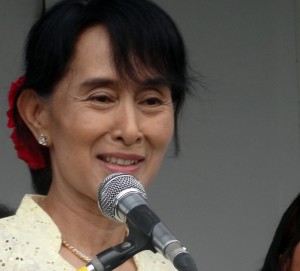Burma’s election body, the Union Electoral Commission (UEC), has been accused of intimidating the opposition National League for Democracy (NLD) party after warning NLD Chairwoman Daw Aung San Suu Kyi (Daw Suu) of violating Burma’s constitution at a political rally earlier this month.
 In a letter sent to the NLD, the UEC claimed that Daw Suu made illegal and unconstitutional comments at a rally in Mandalay on May 18th by calling on Burma’s army to support constitutional reform.
In a letter sent to the NLD, the UEC claimed that Daw Suu made illegal and unconstitutional comments at a rally in Mandalay on May 18th by calling on Burma’s army to support constitutional reform.
In its letter, the UEC claimed that Daw Suu’s speech at the rally included a part in which she said: “I want the army to prove that they wish to amend this Constitution.” The UEC letter contends that this alleged statement exceeded “the boundaries of the Constitution.”
The UEC’s letter, which was sent to the NLD on May 22nd and signed by UEC Secretary Tin Tun, also accused the NLD leader of challenging Burma’s army and claimed that her speech violated her oath as a parliamentarian.
The NLD’s reaction to the letter and the UEC’s accusations was visceral: “We declare that the UEC’s intervention and warnings are inappropriate,” the NLD said in an official statement. The NLD statement also said that Daw Suu was misquoted and denied that her speech violated the Constitution: “We are just doing as stated in the Constitution; that is, any political party can stage a rally freely as long as it’s in accordance with the law,” said the statement.
According to the NLD statement, the UEC misquoted Daw Suu because in her speech she actually said: “Our army has to face the reality and say ‘we will amend the Constitution legally for the good of people,’”
Meanwhile, Human Rights Watch (HRW) criticized the UEC for writing the letter, claiming that Burma’s electoral commission was impermissibly, arbitrarily, and unnecessarily intimidating the political opposition.
HRW’s Asia director, Brad Adams, said that “It’s truly scandalous that the electoral commission is threatening a political party for violating a regulation that doesn’t exist,” and that “It’s even worse that the threat is about a political speech on the future direction of the country.”
Since last year the NLD has teamed up with the “88 Generation Peace and Open Society” to launch a campaign to reform Burma’s 2008 constitution, a document that many commentators believe is highly flawed; gives Burma’s army overwhelming control of the country; and was approved in a sham referendum.
In particular, there is widespread opposition to two articles in the 2008 Constitution, the first of which is article 436, which grants the military 25 percent of parliamentary seats and therefore an effective veto power over all parliamentary actions. The other controversial article is 59(f), which effectively bars Daw Suu from becoming president because it prohibits individuals from running for president if they were married to a foreigner or have relatives with foreign citizenship. Both of Daw Suu’s children have British citizenship and she was previously married to a UK citizen.
HRW’s Brad Adams said that the UEC’s chairman, former Burmese army General Tin Aye, has revealed his “pro-military bias” in the past.
“In April, [General Tin Aye] defended the constitutional provision guaranteeing 25 percent of parliamentary seats to serving military officers, claiming the quota was needed to avert any future coup. He also promised that the 2015 elections would be free and fair, but would be conducted in ‘disciplined democracy style,’ using rhetoric closely associated with past Burmese military governments,” said Mr. Adams.
The electoral commission was also criticized for releasing a series of draft regulations in April which, if enacted, would seriously infringe upon the rights of freedom of speech and movement. The draft regulations include a provision which requires parties to provide information to UEC officials in advance regarding proposed speaking venues; the routes of rallies and marches; and the names of participants expected to attend such events.
The proposed regulations also include prohibit party leaders or members from campaigning in constituencies outside their home districts—a proposal which appears directly aimed at Daw Suu, who would be prohibited from canvassing support across Burma under the regulation.
“How President Thein Sein and the Burmese government respond to the proposals for arbitrary limits on campaigning and to reasonable demands for constitutional reform will tell the world whether they are interested in free and fair elections or are trying to rig the process,” Mr. Adams said. “Future elections will not have an ounce of credibility if anti-democratic rules put opposition parties at a disadvantage.”



